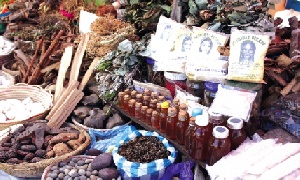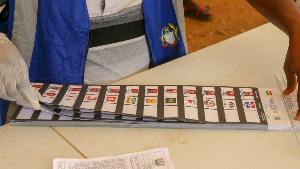The Ghana National Traditional Healers Association in collaboration with regulatory bodies is working assiduously to open up its market share to capture the international community, particularly the USA, by June 2015.
According to the Association, a consultancy firm has revealed that the African community in places like Maryland and Washington D.C., both in the USA, holds herbal medicines from Ghana in high esteem, hence its [Ghana National Traditional Healers Association] keen interest to penetrate those markets to augment foreign exchange earnings from non-traditional exports.
The dream has been rekindled by a 30-day intensive “Training in Quality Herbal Products Manufacturing and Entrepreneurship for Improved Productivity and Competitiveness” for a selected 100 practitioners, Baffour Agyapong, Brong Ahafo Regional Association Chairman, has told the B&FT in an interview.
The training workshop was facilitated by the Department of Herbal Medicine, Kwame Nkrumah University of Science and Technology (KNUST), with sponsorship from the Council for Technical and Vocational Education and Training (COTVET) and Skills Development Fund (SDF).
He said the training has bequeathed to practitioners the needed technical know-how to produce herbal medicines that meet international standard conformity: including bottling; label requirements such as ingredients, dosage, batch numbers, undesirable effects, clinical particulars among others.
“Hitherto, some practitioners were collecting raw materials from roadsides and around refuse dumps; they used to package medicines in empty alcohol and water bottles. We were doing that out ignorance,” he noted.
Mr. Agyapong revealed that the Association has contracted a manufacturing company to produce bottles for its members. “We now also have close ties with the Food and Drugs Authority and the Ghana Standard Authority as well, to ensure periodic standardisation checks at the various facilities,” he added.
He lamented the indiscriminate felling of trees, and the clamour for and excessive use of agrochemicals in controlling weeds, explaining: “The trend is a threat to their source of raw materials, as most medicinal trees and plants species are in danger of extinction.”
He appealed for government to help establish more certified centres at vantage towns to aid their business. He stated that most practitioners -- after testing their sample products at the Akuapim Mampong Centre for Research into Plant Medicine and KNUST -- are unable to produce commercial quantities for sale due to scarce certified production facilities.
Mr. Agyapong concluded: “Governmental support will ensure a vibrant traditional medicine practice; wealth/job-creation; and enhance revenue generation to boost the local economy and also complement operations of orthodox medicine in pursuit of quality healthcare delivery.”
Business News of Tuesday, 30 September 2014
Source: B&FT
Herbal medicine producers target American market
Entertainment
















